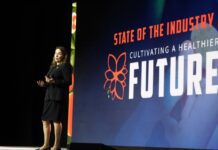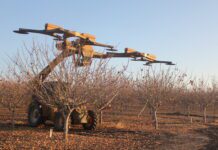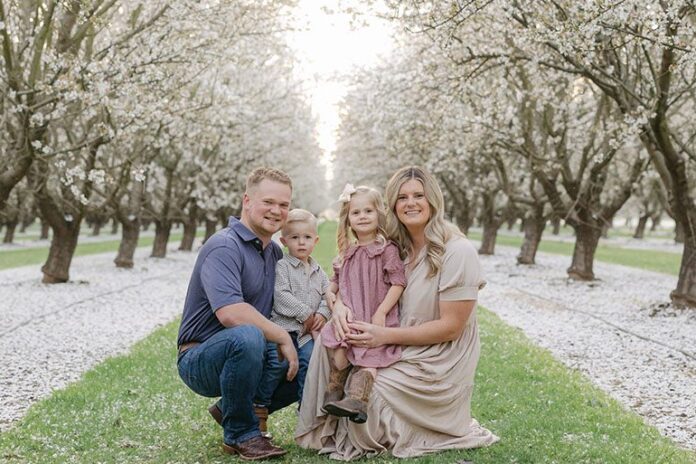
When Brandon Heinrich of B&M Orchards Inc. was in junior high, he wanted to be a petroleum engineer. Until his dad pointed him toward Future Farmers of America in high school.
“He saw that I wasn’t going down the farming path, and he said, ‘Well, just take this one FFA class,’” Heinrich said. “So, kind of begrudgingly, I took it and started getting involved there.”
From the day his FFA teacher challenged the class to memorize the creed, Heinrich was all in.
“I thought, a competition?” he said. “I can get in on this. I accepted the challenge, performed well, and then got my FFA jacket, and ever since then I was determined I was going to do something with FFA.”
While still in high school, Heinrich started a custom orchard spraying business, going to school during the day and spraying crops at night, catching sleep whenever he could. His dad passed away in 2019, so at the age of 22, Heinrich took over his father’s farming operation in addition continuing to grow his own custom farming and spraying company.
“We now farm several hundred acres consisting primarily of almonds along with some olives, cherries, pistachios and alfalfa. In addition, we continue to operate a custom farming business, including spraying and harvesting. In order to diversify over the past few years, we have expanded into offering custom field and row crop spraying and fertilizer spreading application services,” he said.
Heinrich shared his thoughts with West Coast Nut about the issues facing the tree nut industry and his hopes for the future.
Q. Tell us a little bit about the history of your farming operation.
I’m proud to continue on the Heinrich farming tradition as a fifth-generation grower and hope to pass down the passion for farming to my children. Growing up in the nut industry, I had an amazing mentor, my dad, to work alongside and get hands-on experience. Some of my fondest memories and conversations with my dad were out in the field working together. He passed away in 2019 from an unexpected heart attack.
Q. How have things evolved over time?
One thing that comes to mind is the influx of technology that we’re using today. Going back to when I was learning from my dad on how to help determine moisture in the soil and when to irrigate, a lot of our stuff growing up was flood irrigation and impact sprinklers. We didn’t have a lot of drip irrigation or micros. He would take me out, and we’d dig a hole, and he’d show me how to make a dirt ball and we’d check different levels.
Now we’re using pressure bombs, and we’ve got sensors on the trees. We’re really watching our water. I think that really says something for the progression of the nut industry even where we’re fortunate to be in a great irrigation district. Growers are continually adapting for the betterment of the industry.
Q. Can you talk a little about the trend toward regenerative and more sustainable farming practices?
I think that’s definitely the direction the industry’s heading. And I think there can sometimes be a public misconception and misunderstanding when we start talking about that because they’re pretty big, fancy words. What I really look at is, as a family farmer, it is our best intention to be a steward of our land. Nobody cares about this land more than we do.
What really concerns me when talking about that is the influx of investment money and big operations coming into the nut production industry. They’ve always been there, but I would say in the past 10 years, it became a bigger deal. At the end of the day, for most corporate farms, everyday farming practices can be driven by dollars on a spreadsheet over the right solution for the problem.
I think with these large investment companies, you lose some of that personal touch of the farmer to their ground. My dad always told me the best thing for a farm is a farmer’s footprints out in the dirt. That seems to be non-existent when it comes to these large commercial corporate operations.
Tying that all back into the regenerative farming, I think the use of synthetic pesticides and even fertilizers 10 to 15 years down the road will look a lot different. I think we’ll still be spraying and using more biostimulants, fighting fungus with fungi and bugs with bugs, and that’ll be really interesting to see.
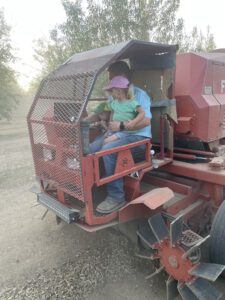
Q. What keeps you up at night related to growing tree nuts?
Water is obviously a huge one. We are doing business in a state that is not necessarily pro-farmer and makes it hard to do business here, especially in regard to water. Like I said, we have some phenomenal water districts around here, but I know there’s a lot of nut producers in areas where it’s going to be a real challenge.
But the other thing that really concerns me is the next generation coming up into this industry. There is such a huge barrier to entry financially, especially someone who wants to become a farmer and they don’t have a farming background and they’re not coming from a generational operation. The ability for somebody to go out and buy 40 acres and start farming… it would be next to impossible. I really see that as a huge deterrent, and it makes me nervous because if you look at the studies, I think the average age of farmers across America right now is 58 or 59 years old.
Q. What’s the solution to keep the next generation from leaving the farm?
That’s a hard one. I’m not sure how you really encourage that. I believe farming is a passion not everyone is born with. It’s something that is cultivated with time and experiences. I think the youth organizations, such as FFA and 4-H, provide a great platform to start that passion in our youth.
As for those in the industry already, I think a simple thing is encouraging this next generation to be involved and encouraging the youth, if there’s interest, to take them under your wing and mentor them.
Q. If a younger person came to you and wanted to get involved in farming, what would you recommend to them?
Don’t be afraid to start at the bottom and work your way up. You don’t get success in this industry overnight, and you have to be willing to put in the work to get it. One of the things I can appreciate most about my upbringing is my dad was pretty much a one-man operation. He did everything from pruning the trees to hand-raking the almonds to getting out in the middle of the night to spray to tying the trees and planting the replants.
Even though I didn’t understand it at that time, and I felt like it was punishment sometimes. Looking back now, having a team of employees and not being the one out in the field actually performing the work, I can appreciate those teaching moments because it’s added so much to my knowledge.
I think it is important for this next generation to not have the expectation that they’re just going to be able to walk into an operation and get to drive around in a pickup and not get their hands dirty.
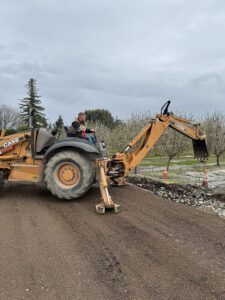
Q. What are you most hopeful about for the future when it comes to growing tree nuts?
I think we’re producing a great product. We have a huge demand for almonds. The world wants our product, so that really encourages me on that.
With some of the challenges we have had over the past several years, market corrections are being made, and prices are starting to come up to profitability levels. But I do think there is a little bit of a disconnect, especially on the retail side. There’s a large gap between grower returns and the retailer price structure. I think moving forward, this still will be a challenge, but if we can get our story and our products out there at a reasonable price to consumers, nuts can sell themselves.
Q. What are your thoughts on what needs to happen for everything to be good for the farmer?
As an industry, we have quite a few acres of trees in the ground. Ultimately, we need to ensure our supply and demand levels are in check. I believe one of the contributing factors that led to some of the difficulties we have been facing over the past couple years started after our record high prices 10 years ago. We have seen orchards planted shortly after the big price explosion coming into production, and compiled with lingering COVID-19 issues and consumer purchasing trends, we simply have experienced an oversupply of nuts. At the end of the day, farming will have its highs and lows. The industry that we devote our lives to is financially risky, but the reason most growers chose this lifestyle is the reward of working hard and producing a marketable product.
Q. What do you think are the biggest assets of the tree nut industry in California?
I think this industry is built of and consists of great people, and I think it’s a very dynamic industry in that sense. I don’t know of any other industry, even in agriculture, where you can be competitors, neighbors and friends all at the same time but are united under the same passion for farming. As I continue to work in the industry, the amount of great people that I meet from all different backgrounds and skillsets, in my opinion, that’s a huge asset that we all can come together in this.
Q. Who’s the biggest influence or mentor for you in your career?
My dad was mine, absolutely. I learned so much from him.
Another that comes to mind is Bob Kamps. Bob has been a mentor of mine similar to what I described before. When I was starting out in high school, I appreciated his willingness to see my desire to get into the industry, and ever since then, he has offered countless amounts of practical wisdom and experience. I really appreciate being able to go to Bob and ask for his advice on how to tackle certain situations in growing almonds; chances are he’s probably already walked that road, or if he hasn’t, he has been able to point me in the right direction with a friend or contact who has.
I have appreciated Bob’s advice early on when he would tell me, “You can’t sweat all the small things in life. And when times get hard, keep your head down, work hard. Don’t worry about what everyone else is doing or saying; just worry about your own.”
Q. What kind of innovation do you see having an impact on the industry in the future?
I think there’s definitely a need for a higher level of tech in our industry. Especially working with the tech on the large application equipment side and being involved in the field crop and row crop side of things, I’m pretty used to seeing very expensive and high-quality tech and how they’re utilizing those in different farming operations in different commodities.
So then when I go back to the almonds and walnuts and the specialty crop side of things, it kind of is almost archaic the lack of tech when it comes to machinery and all that. I think the next thing that I really could see being a huge asset to the specialty crop market as a whole would be figuring out how to get variable rate fertilizer applications.
I think that with AI becoming more accepted and used in various ways, it’s only a matter of time before we can really start utilizing it in the nut growing industry. Once we can accurately rely on yield monitoring, we can take sustainability to the next level with very accurate fertilizer applications based on crop removal and nutrient demands.








